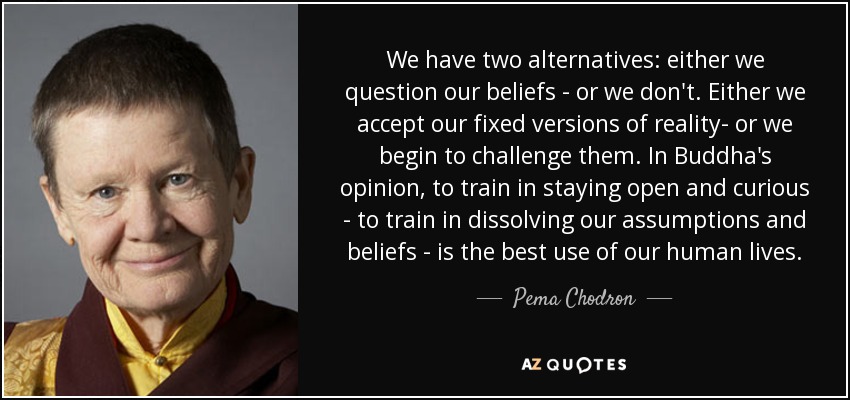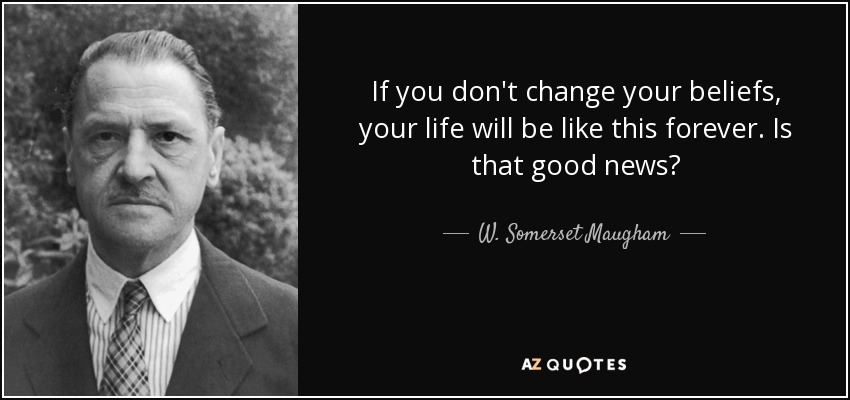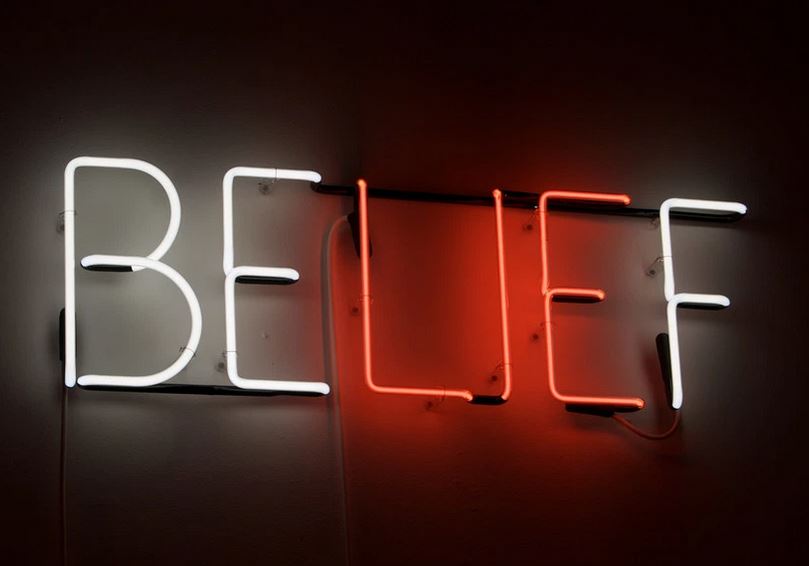Belief - A Terrible Tyrant Or An Empowering Servant
To Believe Or Not To Believe - That Is The Question
The Tyranny Of Beliefs
Beliefs have been a source of great division and distress in my life.
I can recall standing in the living room at my widowed Mother's house, shortly after my Father's death, and my Mother who held deeply felt conservative Christian views shouting at me:
"Stephen, but you do belief in the Virgin Birth, the resurrection of Christ and the Holy Trinity don't you..?"
The argument raged backwards and forward, and eventually I shouted back at her:
"Mother I am a 51 year old man, I am intelligent and well educated, and knowledgeable about Christian theology and church history...I am entitled to my own opinions!!"
"But you DO believe, don't you...? She implored me.
"Mother", I said, "whether I say that I do or do not agree with these things doesn't matter...
...what does matter to me is my inner spiritual experience and at that level you and I are on common ground...
...we are divided in our heads but united in our hearts."
This incident crystallised a lifetime of dissent and division in my family over questions of faith and definition of belief, and as I looked at her anguished face and felt my anger and frustration I realised in a very personal way the tyranny of beliefs.
[The post-script to this anecdote is that a few weeks later, we made our peace and never again discussed matters of religious belief for the remaining 15 years of her life, and we enjoyed many happy times together.]
3 Beliefs About Belief
[1] A belief is something that you accept and believe to be true

That you believe it to be true does not necessarily mean that it can be proven to be true.
This is most applicable to conditioned beliefs, which are the thinking patterns developed at a young age and are based on the beliefs of your primary care-givers.
Some of these beliefs can be unconscious.
These conditioned beliefs become the foundation for your future beliefs and form the basis of your decision-making and problem-solving.
[2] Nothing has inflicted more suffering on humanity than its beliefs and dogmas...

Over the past century, countless millions have been killed and genocides have been committed in the name of various political beliefs: the Maoist and Stalinist purges, the killing fields of Cambodia, Armenia, Rwanda, Yugoslavia, the thousands of lynchings by the Klu Klux Klan in the southern States of the US.
In previous centuries the religious persecution by state supported majorities over non believing minorities such the persecution of the Cathars by the Catholic church and the burning of Catholics by Protestants and vice versa.
At time of writing, the beliefs that have motivated the military aggression and violence perpetrated by Russia against the neighbouring sovereign state of Ukraine.
The religious and cultural beliefs that sanction and allow or impose suppression and subjugation of women's rights, the persecution of minorities, the criminalisation and killing of gay people, female genital mutilation, child marriage, honour killings... the list is endless and in all cases:
Believing themselves to be right, clinging to their beliefs, to the point of killing to defend their view of the rightness of their position.
[3] Contrary to what is claimed, no belief tradition of any persuasion (whether religious, political, cultural or any other) has a monopoly on the truth

Dogmas are collective conceptual prisons. And the strange things is that people love their prison cells because they give them a sense of security and a false sense of 'I know'. [Eckhart Tolle]
The limitations of language and the very structure of our language causes us to identify with "my view" and reinforces the sense that our concept of what is real is real, when it isn’t.
Families and societies have been divided, countless wars have been fought, millions of lives have been lost, over the meaning and interpretation of words.
1. Is it true? Take any belief that you feel strongly about and apply
first principles thinking to it. Test inherent assumptions and take the
belief apart then reconstruct it so that you see what it really is, and then
ask yourself: “Is this fit for purpose?” Apply second order thinking to your belief to uncover
the unintended consequences. Consider all of the impacts of your belief and especially the impact on others who do not share your belief. Question
everything. Involve others. Think long term. Restate your belief and ask “And then what?” Questioning conditioned beliefs is a hard process. This may bring you into opposition with your friends, family and community. However, consider this: group
think [following the herd] can be unhelpful, or even a bad thing, when the outcome of your
decision affects your health, wealth or peace of
mind. Can you wear your beliefs lightly?
Challenging Your Beliefs

2. Can you absolutely know that it’s true?
3. Who would you be without that belief?
Changing Your Beliefs

[1] Where are you most resistant to changing a belief
Take any belief you wish to change and look very closely at where you experience resistance to changing it.
Look very closely at the root of your resistance to uncover the opposing unconscious belief that was originally installed to keep you safe.
This is what you need to overcome.
[2] Reframe it
Reframe this opposing unconscious belief so that the emotional association of the revised phrasing of the belief feels supportive.
[3] Check your body's reaction
Check your progress and ask yourself: "How would I feel if I believed….?"
Check your body's reaction to it and as this will always give a truthful reflection of what you truly feel.
If you still feel resistance repeat steps 1 and 2 until your body feels relaxed and at peace with it.
Next Article:
Herd Mentality And How To Avoid It
Return from: "Beliefs"
to: Walking The Talk
LATEST ARTICLES
Master The Season You Are In - The Key to Fulfilling Your Purpose
 To fulfil your purpose, you must first master the season you are in. One of the biggest mistakes you can make in life is focusing all your energy on the next season instead of learning to master the s…
To fulfil your purpose, you must first master the season you are in. One of the biggest mistakes you can make in life is focusing all your energy on the next season instead of learning to master the s…The Inner Weight of Shame - Sustained By Attentional Fixation
 A Mind That Is Continuously Engaged In Self-Surveillance. Shame is one of the heaviest inner burdens a human being can carry. It does not announce itself loudly or demand attention through drama. Inst…
A Mind That Is Continuously Engaged In Self-Surveillance. Shame is one of the heaviest inner burdens a human being can carry. It does not announce itself loudly or demand attention through drama. Inst…Does Prayer Work? The Psychology of Prayer, Meditation and Outcomes
 Reality Is A Complex System Of Countless Interactions - Including Yours. So does prayer work? The problem is that the question itself is usually framed in a way that guarantees confusion. We tend to a…
Reality Is A Complex System Of Countless Interactions - Including Yours. So does prayer work? The problem is that the question itself is usually framed in a way that guarantees confusion. We tend to a…Living in Survival Mode Without Surrendering Mental Authority
Living in Survival Mode Without Surrendering Mental Authority
 Clear Thinking When You’re Just Trying to Stay Afloat. Many people today are overwhelmed because they are living in survival mode - not temporarily, but as a persistent condition of life. For many, th…
Clear Thinking When You’re Just Trying to Stay Afloat. Many people today are overwhelmed because they are living in survival mode - not temporarily, but as a persistent condition of life. For many, th…Manifestation Without Magic: A Practical Model
 Manifestation without magic is not a softer or more intellectual version of popular manifestation culture. It is a different model altogether. Popular manifestation teachings tend to frame reality as…
Manifestation without magic is not a softer or more intellectual version of popular manifestation culture. It is a different model altogether. Popular manifestation teachings tend to frame reality as…Staying Committed When You Can't See Progress - The Psychology of Grit
 Uncertainty Is Not The Absence Of Progress, Only The Absence Of Reassurance. One of the most destabilising experiences in modern life is not failure, but uncertainty and staying committed when you can…
Uncertainty Is Not The Absence Of Progress, Only The Absence Of Reassurance. One of the most destabilising experiences in modern life is not failure, but uncertainty and staying committed when you can…The Battle For Your Mind - How To Win Inner Freedom In A Digital Age Of Distraction
 From External Events to Inner Events. We often think of “events” as things that happen out there: the traffic jam, the rude comment, the delayed email reply. But what truly shapes our experience is wh…
From External Events to Inner Events. We often think of “events” as things that happen out there: the traffic jam, the rude comment, the delayed email reply. But what truly shapes our experience is wh…How to See Your Thoughts Without Becoming the Story
 A Practical Guide to Thought-Awareness. You can spend your life inside the stories of your mind without ever learning how to see your thoughts clearly and objectively. Most of the stuff we tell oursel…
A Practical Guide to Thought-Awareness. You can spend your life inside the stories of your mind without ever learning how to see your thoughts clearly and objectively. Most of the stuff we tell oursel…The Collison Decision Matrix - A Simple Framework for Better Choices
 The Collison Decision Matrix Is A Practical Everyday Thinking Tool. Most of us spend a surprising amount of time worrying about decisions. From small ones such as what to wear, what to eat, what to te…
The Collison Decision Matrix Is A Practical Everyday Thinking Tool. Most of us spend a surprising amount of time worrying about decisions. From small ones such as what to wear, what to eat, what to te…The Power Of Asking The Right Question
 The Power Of Asking The Right Question Lies In The Quest For Insight. To experience the power of asking the right question you must develop the practice of asking questions. The best way to improve th…
The Power Of Asking The Right Question Lies In The Quest For Insight. To experience the power of asking the right question you must develop the practice of asking questions. The best way to improve th…Site Pathways
 Here is a site pathway to help new readers of Zen-Tools navigate the material on this site. Each pathway is based around one of the many key themes covered on this site and contain a 150 word introduc…
Here is a site pathway to help new readers of Zen-Tools navigate the material on this site. Each pathway is based around one of the many key themes covered on this site and contain a 150 word introduc…
